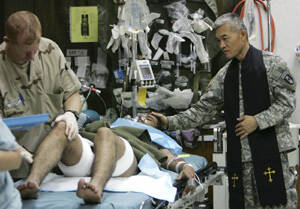Recruiting Father Mulcahey
Many issues of America in recent years have carried advertisements by one or other branch of the U.S. Armed Forces recruiting military chaplains. Some readers have questioned whether a Catholic magazine should publish such advertisements.
The editors of America do not support many of the government’s current uses of the military. We have spoken critically many times about the invasion of Iraq, the use of rendition, the use of torture, the notion of preemptive war and many other troubling policies. Yet even if one disagrees with the Bush administration’s uses of the military, does that mean that members of the military do not deserve pastoral care? Obviously not.
Helping call attention to the need for military chaplains is not the same as endorsing our government’s use of the military, any more than providing pastoral care in an unstable foreign country implies approval of the junta currently in control there. If anything, doubts about the ongoing wars in Iraq and Afghanistan intensify our concern for the men and women who are called upon to carry out their missions at the risk of both their lives and at times their spiritual welfare. The pastoral need is clear.
This is not to say that there are no issues to be considered. Some, for example, like Tom Cornell in this issue, argue out of concern about possible conflicts of interest that chaplains should be civilian employees rather than military personnel. Likewise, there is the ecclesiastical issue of who qualifies as a minister. Military chaplaincy by Catholics is currently limited to priests; but the times clearly call for service by deacons and the nonordained as well.
Few people come face to face with the ultimate questions of our humanity more often, and at greater personal cost, than do members of the military. We support efforts, including those by the armed forces and their critics, to provide them with the spiritual resources they need.
A Great Experiment
A widely respected 100-year-old publication, financed in part by a religious organization, recently announced that it will no longer produce its usual print edition.
No need to worry, dear reader; the publication in question is The Christian Science Monitor, not America, but you can be forgiven for your anxiety. These are nervous times for readers of print, as newspapers and magazines across the country continue to reduce staff in the face of declining ad revenue and worsening financial conditions.
The Christian Science Monitor deserves special mention, however, and not just because it is the first daily newspaper to make a wholesale move to the Web. (The Monitor will make the switch in April, when it will begin publishing a weekly magazine to complement its daily Web content.) The Monitor is one of the most successful of a dwindling breed of small publications that cater to audiences underserved by the mainstream media. The Monitor was founded as a response to the yellow journalism of the early 20th century, and over time it developed expertise in international reporting. Today, it maintains eight foreign bureaus, more than some major metropolitan newspapers. That The Monitor is church-financed (it is sponsored by the First Church of Christ, Scientist, in Boston) is a reminder that religious groups can play an important role even in a crowded media landscape. The Catholic media would do well to keep an eye on The Monitor’s great experiment.
Take, Break, Share, Love...
“Mad Men” is an Emmy-award winning series about advertising executives in the early 1960s that just wrapped up its second season on AMC. The show, which probes the complicated lives of the employees at Sterling Cooper Inc., is suffused with a deeply Catholic sensibility. One account executive, for example, pitched a new campaign for Popsicles: “Take it, break it, share it, love it.” That eucharistic allusion, noted another executive, sounded “very Catholic.” The show’s protagonist, the suave ladies’ man Don Draper, regularly offers paeans to consumer goods that make the product sound almost like a sacrament, a visible sign of some invisible reality—as when he called a Kodak Carousel slide projector a “time machine.”
Outside the windows of the agency’s fictional offices in Manhattan are the steeples of St. Patrick’s Cathedral. Though traditional religious values are visible, they are not relevant. You can see them, but you cannot reach them. Yet those values, abandoned by many in the office and at home (Don goes AWOL from his family; Roger, the silver-haired office Lothario, dumps his wife; one secretary’s fiancé rapes her in the office; Don’s wife has a tryst with a stranger) seem necessary. “Tell the truth,” says one character. But truth-telling proves difficult, and failure to do so leads to anomie and unhappiness.
As the show has progressed, it has become less like “American Graffiti” and more like an Albert Camus novel. Characters search for meaning but are hard pressed to find any, other than what they create. The lack of any value system other than upward mobility has left the characters of this popular show lost, confused and, yes, mad.








